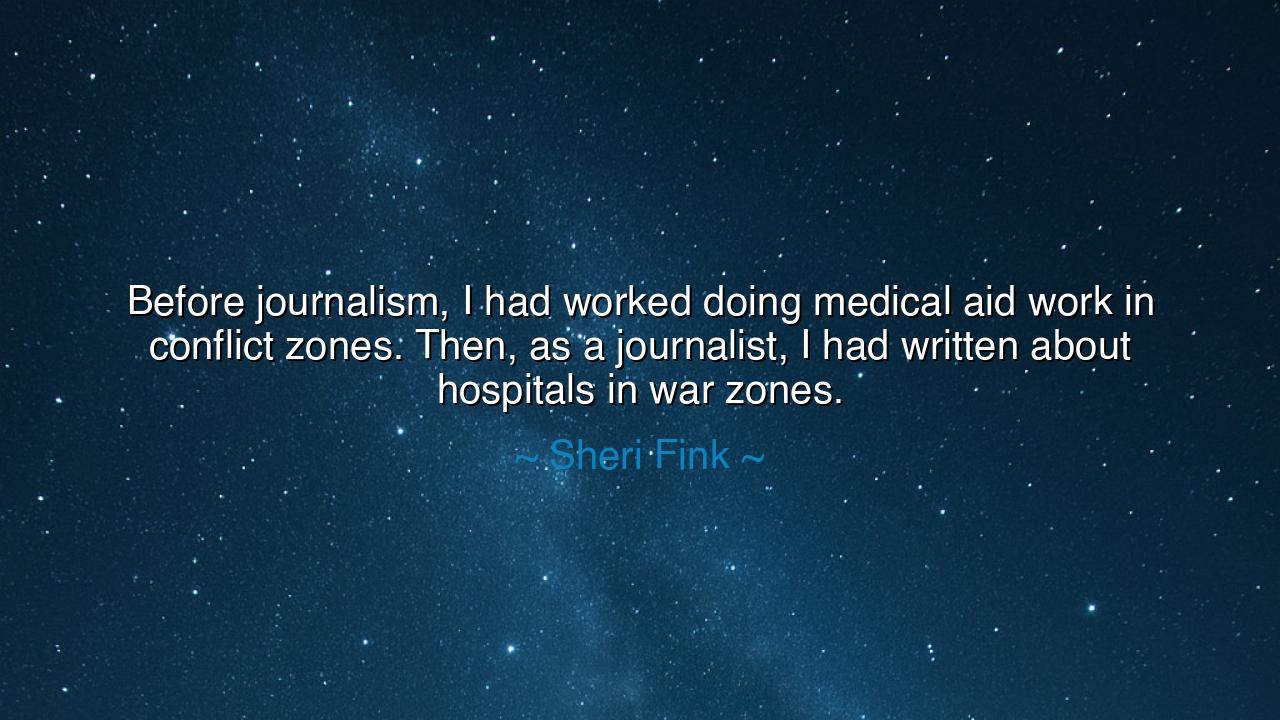
Before journalism, I had worked doing medical aid work in
Before journalism, I had worked doing medical aid work in conflict zones. Then, as a journalist, I had written about hospitals in war zones.






"Before journalism, I had worked doing medical aid work in conflict zones. Then, as a journalist, I had written about hospitals in war zones." — Sheri Fink
Hear now the voice of one who has walked through the valley of suffering and returned bearing witness — Sheri Fink, whose words echo like a hymn of duty. She speaks not from comfort or theory, but from the edge of despair and courage. In her confession lies a rare truth: that there are souls who serve both with their hands and with their words, who heal wounds not only of flesh, but of understanding. Her path — from medical aid work to journalism — is a testament to the sacred bond between action and story, between saving life and telling the truth about life.
Fink began her journey in the shadow of war, where the cries of the wounded rose like prayers to a silent sky. As a medical worker in conflict zones, she did not merely read of suffering — she touched it, breathed it, carried it. There, amid the chaos of battle and the crumbling of nations, she learned the fragility of humanity. Later, as she took up the pen, she carried that same purpose into the realm of words. Her mission changed form, but not spirit: to reveal, to remember, and to ensure that no act of mercy or cruelty was lost to time’s indifference.
In the ancient world, those who bore witness to war were called chroniclers — keepers of the world’s memory. But few among them had also been healers. Sheri Fink stands among that rare lineage who bridge two sacred duties: to heal and to reveal. Her book Five Days at Memorial tells of a hospital in New Orleans during the storm of Hurricane Katrina, where doctors and nurses, besieged by flood and chaos, faced impossible moral choices. Through her words, she did not judge — she illuminated. She brought forth the questions that haunt every soul who has stood between life and death: What does it mean to save? What does it mean to let go?
Such is the meaning of her quote — that the healer and the witness are two sides of the same truth. One mends the broken body; the other mends the broken memory of mankind. Her journey from tending the wounded to writing their stories shows that compassion takes many forms, and that even when one cannot stop the war, one can still ensure its victims are not forgotten. For to speak of suffering truthfully is itself a kind of healing — a balm for the conscience of the world.
Consider, too, the example of Florence Nightingale, who began as a nurse in the Crimean War but became the world’s first great medical reformer through her writings. She gathered the cries of the wounded and turned them into statistics and reports that moved governments and reshaped the future of care. Like Fink, Nightingale understood that the pen, when wielded with empathy and truth, can heal nations as surely as the hand that binds wounds. The battlefield and the written page are both arenas of struggle — one against death, the other against forgetfulness.
The lesson of Sheri Fink’s life is this: that every soul must find its way to serve, and that service may change its shape as life unfolds. You may begin by healing one, and end by enlightening thousands. Do not despise the transformations of your path, for the spirit of your purpose will remain if it is rooted in compassion. Whether you act, or write, or speak — let your work bear witness to human dignity, especially when it is most endangered.
So, O children of the world, remember this teaching: wherever pain exists, so too must courage. Do not turn away from the cries of the wounded, whether they are before your eyes or hidden behind screens and silence. And if you cannot heal with your hands, then heal with your truth. Speak of what is unseen, lift up what has been buried, and carry the light of memory into the world’s darkest corners. For as Sheri Fink has shown, those who have seen suffering and choose to write of it become the guardians of our shared humanity — the storytellers who remind us that even amid war, the heart can still choose compassion.






AAdministratorAdministrator
Welcome, honored guests. Please leave a comment, we will respond soon